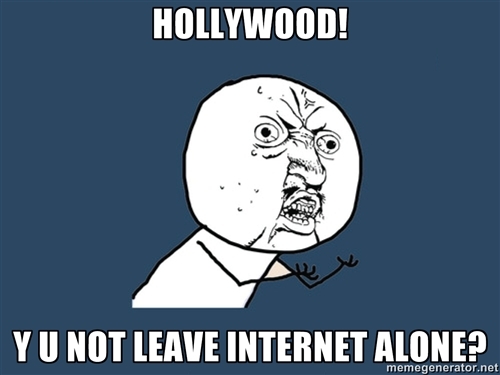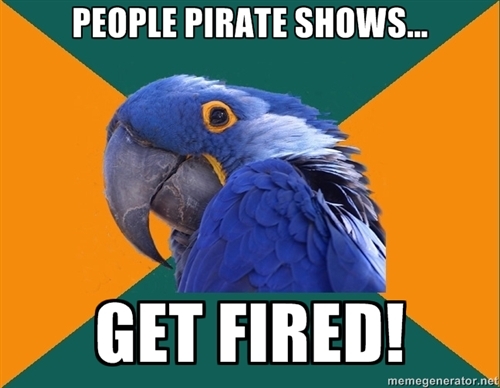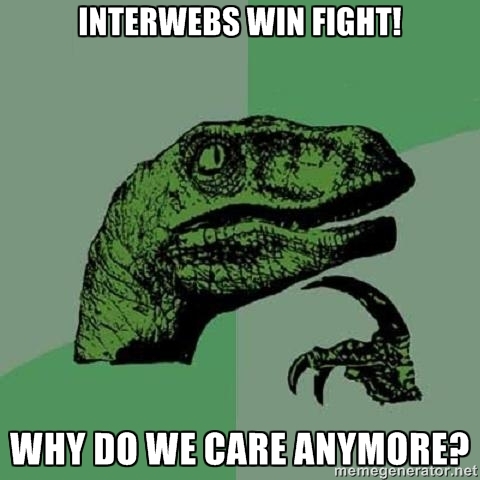The widespread grassroots protests and blackouts against the SOPA and PIPA bills effectively killed these incarnations of new copyright policing. Many are congratulating each other on a job well done, and rightly so.
But don’t think this debate is over. To quote John Rambo, “Nothing is over.”
What the protests did was reduce political support, raise general awareness, and most importantly get the issue talked about on The Daily Show.
To understand what’s driving this kind of legislation requires a little insight into the thinking within the large companies.
Contrary to popular belief, executives at large media companies are not the Nazgul. They are not insane villians plotting world domination. For the most part, they are nice people that you probably would find interesting to talk to over drinks. I spent the majority of my adult life working with these people.
The media executives know it’s a losing battle. They are going after locker sites like MegaUpload because then know they can’t do anything about newsgroups and private darknets. They continue suing bittorrent users even though they know it’s bad PR and doesn’t stop piracy. They still try to do things like “plug the analog hole” and down-ressing HD content even though it’s a complete waste of time and does nothing to prevent piracy.
What many people need to learn is why?
Why in the face of such a daunting task, do media companies continue to hammer away with things like SOPA and PIPA?
If you read some of the posts on the interwebs, they would have you believe that the reasons these bills are being pushed are things like this:
- They hate freedom
- They don’t understand fair use and/or copyright law
- They want to censor what you say
- They are part of a government plot to block political speech
- They hate puppies and kittens, cheer for Darth Vader & the Daleks, and eat your children
While those reasons do make people get riled up, and I have pondered about the white armor I’ve seen stashed in various corporate closets, the reality is far different and much more mundane.
Here are the real reasons that SOPA & PIPA were proposed, and the reason why lobbying for similar things will continue in the foreseeable future.
The Stock Price – Every three months the companies have to release financial figures that are looked at by Wall Street analysts to determine if they get the thumbs up or thumbs down. The stock price is very, very, VERY important to the top executives in media companies because it determines if they will continue in their job and how much of a bonus they will get.
Media companies love to point to piracy as claim of losses to justify lower profits. A lot of effort goes into creating “piracy loss” estimates, just to help the various CFOs justify the earnings. It’s much easier to say, “If it wasn’t for all these pirates, we’d have made more money!” than saying “Our fundamental business model is changing and it’s unclear where we’ll be in five years.”
The method used to estimate the losses would receive an F if submitted in a college course. Yes, there is some loss of revenue to piracy, but the methods, logical leaps, and invention of numbers utilized in these reports are completely unsupported. They are so bad, that there’s even internal debate about how full of crap the estimates are.
Contracts with Talent – The term ‘Talent’ refers to the creative people that do the acting, writing, directing, and others that turn ideas into entertainment. Groups like the Director’s Guild, Writer’s Guild, SAG, AFTRA, and IATSE all insert language into contracts that force the studios to use things like DRM and agreed to aggressively pursue copyright infringement. The logic of the guilds is simple; every product that is pirated instead of sold is less money to their members.
Contracts with Distributors – Cable & satellite providers, television networks, mobile providers, brick and mortar stores, and digital media outlets all pay a huge amounts for the right to use, sell and retransmit content from the studios. They don’t want people getting the content for free. As a result, contracts with distributors have language that requires the media companies to crack down on piracy. Combined with the insistence on DRM by the Talent and Studios, you have an interlocking set of agreements that basically prevent anyone for advocating an unsecured solution or allow them to ignore piracy.
Legal Standing – Beside the person at home downloading shows via a torrent or newsgroup, there are some serious criminals operating on pirated content. There are entire companies devoted to creating counterfeit DVDs, Blu-Rays and other versions for sale in Asia, Russia, and the Middle East. Even in Los Angeles, home to Hollywood, you can visit Santee Alley and buy counterfeit discs. To combat this organized criminal effort involves a lot of lawyers. IANAL, but from the legal point of view, the media companies want to show that they have tried every possible way to stop piracy and that the counterfeiters are actively going around these measures.
The reason behind the FBI warning is not to deter anyone from pirating content, it’s simply to be able to say in court, “This person saw the FBI warning, knew what they did was illegal, and can’t claim ignorance.” Just like if you buy a toaster, the manual will warn you not to stick a fork in it. Not to educate you, but to use against you in court if you sue them later, after sticking a fork in your toaster.
International Distribution – Critical to the media business is selling content made in one country to distributors in another country. The value to the buyer comes from being able to get the eyeballs/sales via their distribution conduit. The value drops dramatically if it’s available for free. This is why you see so much geo-blocking to prevent Europeans from viewing video on American sites and vice versa. The studios have had to drastically revise their release windowing schemes to help reduce the amount of piracy, but even a couple day delay is too much for some passionate viewers. Contracts require the studios to fight piracy aggressively. I’ve been in the room when distribution partners turn a laptop around, show a streaming version of a show, and say “Why should we pay you £200,000 per episode when people can get it for free?”
Piracy does cause lost revenue – As much as people don’t want to admit it, piracy does cause a loss of revenue to the studios, and as a result, people on all sides make less money. Many people try to justify this by saying that those people are already rich, but it doesn’t make it any less true. There are many people without a lot of extra money to pay for movies or cable that pirate content to stay entertained. I can’t say I put a lot of blame on those people. But, I do know several people that have literally made millions of dollars on internet companies that don’t pay for cable, but do pay for elaborate downloading set-ups with newsgroups, auto-downloading, media centers and TV set-ups that would make Hollywood moguls jealous. The truth is that many of the people that participate in illegal downloading could pay for the content, but simply don’t.
The point is not to justify the tactics of the media companies; it’s to help educate people on why things like SOPA and PIPA get proposed. Until the underlying issues start to change, the lobbyists will still get paid, and the politicians will bring up new legislation.
The music industry has already begun to start resolving their versions of these issues, but not without suffering a near-death experience. What will it take for change in the television and film industries? Probably a lot more change in the marketplace with new competitors bringing new ways to watch television and movies. But remember, the media companies are well funded, well armed, and like Rambo, ruthless with people that they view as the ones that started the fight.
Understanding the true drivers in the Copyright Wars is critical to creating a reasonable and effective response. Logic and reason should guide grassroots organizations, not raw emotion.
“If you know the enemy and know yourself, you need not fear the result of a hundred battles. If you know yourself but not the enemy, for every victory gained you will also suffer a defeat. If you know neither the enemy nor yourself, you will succumb in every battle.” – Sun Tzu



